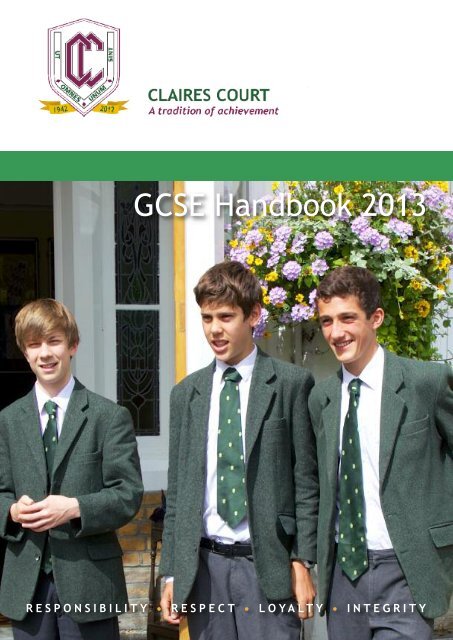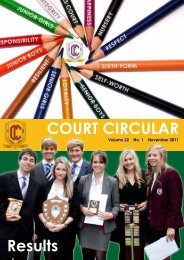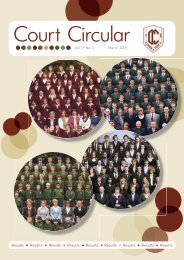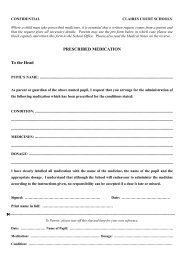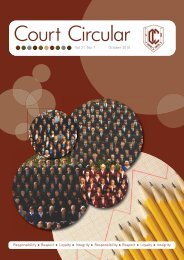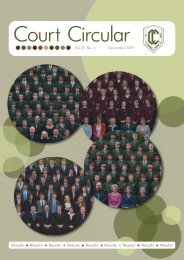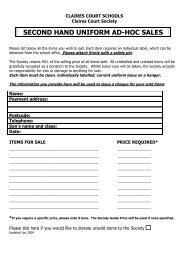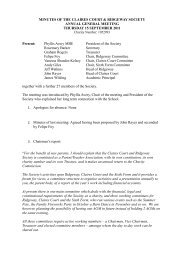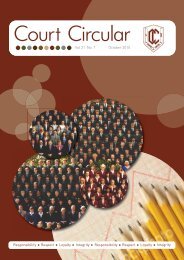GCSE Handbook 2013 - Claires Court Schools
GCSE Handbook 2013 - Claires Court Schools
GCSE Handbook 2013 - Claires Court Schools
- No tags were found...
You also want an ePaper? Increase the reach of your titles
YUMPU automatically turns print PDFs into web optimized ePapers that Google loves.
<strong>GCSE</strong> <strong>Handbook</strong> <strong>2013</strong>R E S P O N S I B I L I T Y • R E S P E C T • L O Y A L T Y • I N T E G R I T Y
Senior Boys <strong>GCSE</strong> Options <strong>2013</strong>Dear ParentThe process by which your son will select the subjects he will study at <strong>GCSE</strong> in Years 10 and 11 is an importantone. Getting the subject choice right is essential in terms of providing the stepping stones to A Level and HigherEducation, and to ensure that your son as far as possible enjoys his studies.In general subject choices should be guided by the following criteria.• Subjects should reflect your son’s academic strengths• Subjects in which he has an interest and a passion• Maintaining a balanced portfolio of subjects and areas• A Level and Career-related subjectsOutline of the Process by which we will guide parents and boys to the most effective choices for the <strong>GCSE</strong>course.Year 9 pupils are currently receiving preliminary talks on choosing Options and Careers during their normal yearassemblies, on both existing subjects and those new for <strong>GCSE</strong>.Friday 15th February: <strong>GCSE</strong> Options <strong>Handbook</strong> issued before half term.Start of COA Probe Careers program for Year 9 pupils to introduce the nature of future careers and assist themin making <strong>GCSE</strong> choices.COA Probe is an on-line program - http://www.coa.co.uk/probe - which helps pupils to relate their strongerinterests and school work with the world of work and to be better prepared to make choices for <strong>GCSE</strong>. We usethe big brother of Probe, COA Preview at the end of Year 10, to provide further support to identify more carefullypossible career paths, linking those to the most appropriate AS/A level or vocational subjects that fit bothinterests and aptitudes.Monday 11th March: Submission of provisional <strong>GCSE</strong> subject choices FormWe need you to make Preliminary Choices based on this information, as this is to enable us to plan the schooltimetable for next year. A separate copy is enclosed for you to complete and return.Tuesday 5th March Options Fayre, please be in attendance from the start.The evening will start with <strong>GCSE</strong> Choices talk, followed by discussion and decision on academic progress andchoices; all subjects will ‘man’ Subject display stalls which parents and pupils visit to find out more.Monday 25th March Year 9 work with Connexions Careers Adviser Helen ColeThis provides the pupils with a further opportunity to ask questions and be made more aware of opportunities.This final meeting will conclude our period of planning, discussion and the finishing of Option choices bySummer half-term.• Option choices are reviewed in the light of the internal summer examinations held later in May, andcontinued commitment to lessons.• Pupils opting for new subjects will have a short interview by a subject specialist to check on interest andaptitude.• In Science we will be deciding after the external modular examinations results are published in Augustwhether the boys sit 3 Single Sciences or a Dual Award. We would expect Sets 1/2 to sit three singleSciences and Sets 3/4 the Dual Award.• Final curriculum information will be sent home at the start of the Autumn Term in September.Yours sincerelyJohn Rayer
Options for <strong>GCSE</strong> Courses Starting September <strong>2013</strong><strong>Claires</strong> <strong>Court</strong> SchoolOptions for <strong>GCSE</strong> Courses Starting SEPTEMBER <strong>2013</strong>PRELIMINARY CHOICESPUPIL NAMEFORMCompulsory SubjectsEnglish (to include English Literature)MathematicsTriple Sciences (Physics, Chemistry & Biology) are studiedModern Foreign Language – choose one of French, German or SpanishOptional SubjectsHumanities:Practical:Geography, History, Religious Studies.Art, Design & Technology, Business Studies, Business & Communication Systems,Drama, Music, Physical Education.Other subjects: Latin (for those already studying the subject).LANGUAGEHUMANITYSUBJECT CHOICE 1SUBJECT CHOICE 2A second humanity may appear in either subject choice one or subject choice twoPlease complete and return this sheet by Monday 11 March <strong>2013</strong>
Contents1. The <strong>GCSE</strong> Course 22. Subjects 3(a) Core SubjectsEnglish Language & English Literature 4Mathematics 5Science 6-7MFL 8FrenchGermanSpanish 9(b) Optional SubjectsArt & Design 11Business and Communication Systems 12Business Studies 13Design and Technology 14Drama 15Geography 16-17History 18Latin 19Music 20Physical Education 21Religious Studies 22-23R E S P O N S I B I L I T Y • R E S P E C T • L O Y A L T Y • I N T E G R I T Y
The <strong>GCSE</strong> CourseThe <strong>GCSE</strong> Course your son will follow for the next twoacademic years consists of a Core offering of 4-7compulsory subjects and up to 4 optional subjects. At thetime of preparation, OfQual are reviewing all <strong>GCSE</strong>qualifications, and for many <strong>GCSE</strong> subjects, therequirement for one stage of assessment at the end ofYear 11 is expected to become an essential ingredient.Government feels that this will liberate the Year 10curriculum from a stranglehold of assessment activities itimposed 2 years ago.Compulsory Subjects (4 - 7 <strong>GCSE</strong>s)English (including English Literature for most)Mathematics (plus Statistics for the more able)Science; all three Sciences(Physics, Chemistry & Biology) are studied.PSHCEIn addition we require our pupils to take at least• one Modern Foreign Language*, French or German or Spanish• one Humanity, Geography, History or RSComplete Subject rangeArt & DesignBusiness & Communications SystemsBusiness Studies, Drama, French, Geography, History,Music, Physical Education, Religious Studies and DesignTechnology.The majority of pupils will take the Core curriculum, ONEForeign Language and at least ONE Humanity. In doing so,this means they may qualify for the English Baccalaureatepromoted by the current Government.A further TWO other subjects may be chosen, giving eachpupil up to a total of 11 <strong>GCSE</strong> awards. Some may take fewersubjects through to <strong>GCSE</strong> (due to a reduction to doubleaward Science and removal of English Literature to focus onEnglish Language only).As the time approaches and particularly following TrialAssessment Examinations in Year 11, a further reduction insubjects may be in the best interests of some. If specificextra tuition is required, this will attract an extra tuition fee.In each subject description, the department concerned hasincluded the expected commitments/costs attached to their<strong>GCSE</strong> course.Those subjects that have extensive coursework componentshave indicated this. Some have residential components whichare compulsory; others have optional visits and trips. Pleasestudy these carefully; to support the learning of a ModernForeign Language for example, it is important that thestudent has the opportunity to visit the country and practisethe oral skills acquired.<strong>GCSE</strong> Exam board entry fees have been called for review bythe Government, and will be notified separately once theyhave been agreed. Current costs are about £28.95 persubject.Careers AdviceYear 9 students will be receiving careers advice in school onthe issues that they need to consider when making theirsubject choices, both from their teachers and from theCareers Service. “Please remember career choice is not theonly criterion to bear in mind when choosing options. Youmust also take into account other aspects of your life suchas your leisure interests. Your subject teachers, formteachers and Head of Year, Mr Bowen, will be pleased tohelp you make your decisions, and independent advice isreadily available from the Careers Adviser who visits theSchool, Ms Helen Cole".The School’s major PE and games programmes continue, witha full set of fixtures and commitments in Rugby, Football,Cricket, Athletics, Rowing, Sailing, Swimming etc. as doesour extensive co-curricular and after school activityprogramme. Other important skills are covered in Years 10and 11, through the PSHCE course, our varied assemblies,concerts, services, shows and visitors’ programme, and (newfor 2012) through our <strong>Claires</strong> <strong>Court</strong> 'HUB' open learningenvironment and the associated Google Apps for Educationutilities.For further information and advice on the <strong>GCSE</strong> course,choosing options and balancing the various demands pleasedo feel free to contact us.Mrs Ronell Selzer, Director of Studies,rls@clairescourt.netMrs Pauline Carr, Director of Curriculum Managementpuc@clairescourt.net2* Unless disapplied because of specific educational difficulties.
Core SubjectsEnglish Language & English LiteratureMathematicsScienceMFLFrenchGermanSpanish
English Language & English Literature - a combined course for <strong>GCSE</strong>ENGLISH LANGUAGE and ENGLISH LITERATURE (2 <strong>GCSE</strong>s)(HIGHER OR FOUNDATION TIER, SETS 1-3)Aims and ObjectivesOverall the course aims to develop pupils’ ability to read,understand and respond to all types of text, construct andconvey meaning in written language and increaseunderstanding and interpretation of the spoken word.ContentThe courses cover a wide variety of genre including drama,poetry and prose from both pre-1914 and the modern era.Pupils are provided with the Edexcel Poetry Anthology,which includes a choice of four collections of poetry.The courses furthermore require candidates to adapt tovarious styles of writing. Speaking and Listeningassignments are integrated into the course and will usuallysupport work in other areas.Pupils will have six periods of English per week, usuallywith two homeworks. In addition to this the pupils areexpected to read the set texts in their own time. Reading avariety of texts is essential for success.Career PotentialA qualification in <strong>GCSE</strong> English is an essential pre-requisitefor entry to further and higher education.Every career demands an ability to use English in its spokenand written forms. Pupils learn to formulate thoughts inspeech and writing with a care for content, appropriatenessand accuracy.The importance of this subject cannot be over-emphasised.Examination ComponentsENGLISH LANGUAGEUNIT 1 : ENGLISH TODAY In Year 10, we study a choice ofnon-fiction extracts, develop the skills to compare andcontrast, and at the end write two timed essays, each of twohours.• Reading task • Writing taskUNIT 2 : THE WRITER’S VOICE In this unit, pupils study a textfrom a different culture such as 'Of Mice and Men', in order todevelop appropriate writing skills so that they can analyse thelanguage features from an extract of a novel underexamination conditions. In addition to this candidates have tocomplete a writing task.UNIT 3 : THE SPOKEN LANGUAGEOver the course of 2 years, pupils will practice, rehearse andextend their abilities to discuss individually, as groups and in4role play, assessed through oral examination. In addition,investigations of radio plays and films give rise to individualcreative writing pieces around dialogue, and concluding in anextended written analysis of the language we hear and use.ENGLISH LITERATUREUNIT 1 : UNDERSTANDING PROSEPupils study one classic text such as 'Animal Farm' andanother such as 'Of Mice and Men', drawn from a differentculture. They learn to compare and contrast characters,themes and language of the two, and are examined at theend of Year 11. The 'Different Cultures' text is also drawnupon in other areas of study in the subject. There is aconcluding examination at the end of the course.UNIT 2 : UNDERSTANDING POETRYPupils study a number of poems from an approved poetryanthology, for style, language, structure and form; skills areexamined through poems based on the collection and oneunseen. This is examined at the end of Year 11.UNIT 3 : SHAKESPEARE AND CONTEMPORARY DRAMAPupils study a Shakespeare text such as 'Macbeth' andcompare this to a film adaptation, in so doing acquireappropriate skills for reading and responding to Drama texts.Further investigation of contemporary text such as 'AnInspector calls' builds the capability to analyse the writer'scraft. Examination is through 2 separate 2 hour controlledassessments.English - a single course for <strong>GCSE</strong>ENGLISH (1 <strong>GCSE</strong>) This is a single <strong>GCSE</strong> and the course will befollowed by candidates in Set 4. Although this is a singleaward course excluding English Literature, the award remainson offer on both the Higher or Foundation Tier.UNIT 1: ENGLISH TODAY(The same as English Language Unit 1)UNIT 2: THE WRITER’S CRAFT This unit is assessed through a 2hour external examination. Candidates will be looking at one playby Shakespeare (Macbeth) and on prose text (Of Mice and Men)from different cultures and traditions. The aim here is to developwriting skills to respond to situations, issues or problems and to usesupporting evidence.UNIT 3: CREATIVE ENGLISH This unit will be internally assessed andexternally moderated. Candidates will need to develop skills inspeaking and listening, In writing imaginatively and creatively andstudy a themed collection of 15 poems.For further information please contact the Head ofDepartment, Mr Luke Wespieser, law@clairescourt.net
MathematicsFrom <strong>2013</strong> pupils will follow a Linear MathematicsSpecification in Edexcel <strong>GCSE</strong> in Mathamatics A (1 MAO)Aims and Objectives1. Development of mathematical knowledge as well asoral, written and practical skills in a manner whichencourages confidence.2. The ability to read mathematics, and write and talkabout the subject in a variety of ways.3. Development of a feel for number, the ability to carryout calculations and to understand the significance ofthe results obtained.4. The ability to apply mathematics in everyday situationsand to develop an understanding of the part whichmathematics plays in the outside world.5. The ability to solve problems, present the solutionsclearly, check and interpret the results.6. Development of an understanding of mathematicalprinciples.7. The ability to recognise when and how a situation maybe represented mathematically, to identify andinterpret relevant factors and, where necessary, toselect an appropriate mathematical method to solve theproblem.8. The ability to use mathematics as a means ofcommunication with emphasis on the use of clearexpression.9. Development of the ability to apply mathematics inother subjects, particularly science and technology.10. Development of the abilities to reason logically, toclassify, to generalise and to prove.11. Appreciation of patterns and relationships inmathematics.12. Development of mathematical abilities by considerationof problems and the conducting of individual and cooperativeenquiry and experiment, including extendedpieces of work of a practical and investigative kindPupils will be taught in sets: decisions about the mostsuitable tier of assesment to be sat will be determined at alater stage.ContentSome pupils in the top set in Year 10 will have theopportunity to follow the Edexcel Statistics (2 ST01)syllabus alongside the Higher Level Mathematics <strong>GCSE</strong>course. These pupils will carry out a statistical project andproduce a written report as a controlled assessment whichwill form 25% of the overall mark for the <strong>GCSE</strong> Statisticscourse.MethodologyThe course will be assessed at the end of two years withtwo written papers; one calculator and one non-calculator:Each contribute 50% of the final grade. There is nocoursework component for this specification.Examination ComponentsThe linear Two-Tiered syllabus provides for two levelsof entry:Higher Tier – Grades Available are A*, A, B, C, D (E allowed)Foundation Tier – Grades Available C, D, E, F, GPupils will study six main areas of Mathematics as part ofthis course: Number, Algebra, Geometry, Measures,Statistics and Probability.It is worth pointing out at this stage that if a candidate failsto achieve the lowest grade in the level at which he hasbeen entered, he will be unclassified. In practice, thismeans that a candidate will not be entered for the Higherlevel if he is not capable of achieving at least a “C” grade.Career PotentialIt cannot be stressed too strongly that this subject iscentral for any career that the pupils may choose to follow.This applies to candidates who are going on to study atA Level and also to those who may wish to take collegecourses in further education.For further information, please contact the Head ofDepartment, Mrs Juliana Myers, jum@clairescourt.net5
ScienceIntroductionThe syllabus followed is that of AQAScience is a compulsory subject for all pupils in Years 9, 10and 11 and to fulfil national requirements, all three sciencesmust be studied up to the age of 16. In order to achieve this,all pupils study a Balanced Science course in PhysicsChemistry and Biology.Sets 1+2: The AQA specification leads to a single award <strong>GCSE</strong>for Core Science specifications in Year 9, a second singleaward <strong>GCSE</strong> Additional Science in Year 10 and a third one inYear 11.Sets 3+4: The AQA specification leads to a <strong>GCSE</strong> pass for CoreScience and Additional Science over three years culminatingin two <strong>GCSE</strong> awards at the end of Year 11.The schemes of work based on this syllabus will provide aworthwhile educational experience to all pupils of allabilities, whether or not they go on to study science beyond<strong>GCSE</strong>.AimsThis specification gives candidates opportunities to:• acquire knowledge, skills and understanding of how Scienceworks in the world at large as well as in the laboratory .• acquire a systematic body of scientific knowledge, and theskills needed to apply this in new and changing situations ina range of domestic, industrial and environmental contexts• acquire an understanding of scientific ideas, how theydevelop, the factors which may affect their developmentand their power and limitations• plan and carry out a range of investigations, considering andevaluating critically their own data and that obtained fromother sources, and using ICT where appropriate• evaluate in terms of their scientific knowledge andunderstanding, the benefits and drawbacks of scientific andtechnological developments, including those related to theenvironment, personal health and quality of life, andconsider ethical issues• select, organise and present information clearly andlogically, using appropriate scientific terms andconventions, and using ICT where appropriate.ObjectivesThis specification requires that all candidates demonstratethe following assessment objectives in the context of thecontent and skills prescribed. Within each of the assessmentobjectives the assessment must take account of candidates’ability to communicate clearly and logically, using specialistvocabulary and conventions where appropriate.A01 Knowledge and understanding of science and howscience worksCandidates must be able to:• Demonstrate knowledge and understanding of the scientificfacts, concepts, techniques and terminology in thespecification• Show understanding of how scientific evidence is collectedand its relationship with scientific explanations and theories• Show understanding of how scientific knowledge and ideaschange over time and how these changes are validatedA02 Application of skills, knowledge and understandingCandidates must be able to:• Apply concepts, develop arguments or draw conclusionsrelated to familiar and unfamiliar situations• Plan a scientific task, such as a practical procedure, testingan idea, answering a question or solving a problem• Show understanding of how decisions about science andtechnology are made in different situations includingcontemporary situations and those raising ethical issues• Evaluate the impact of scientific developments or processeson individuals, communities or the environment.A03 Practical, enquiry and data handling skillsCandidates must be able to:• Carry out practical tasks safely and skilfully• Analyse and interpret qualitative and quantitative datafrom different sources• Consider the validity and reliability of data in presentingand justifying conclusions.6
Weighting of assessment objectivesA01A02A03Knowledge andunderstandingApplication of skills,knowledge andunderstanding,Practical, enquiry anddata handling skills36%(of which aboutone third forrecall)44%(evenlydistributedacross all aspectsof the objective)20%Summary of the Specification ContentPupils would have completed Core Science by the end of Year9 and been assessed.Year 10 CONTENT Additional ScienceThe course is comprised of 3 modules, each module relatingclosely to one of the scientific disciplines and a practical andinvestigative skills assessment.Additional ScienceBiology 2Chemistry 2Physics 2ScienceCentreassessedUnit to becarried outeach yearCells and simple Cell transportTissues, organs and organ systemsPhotosynthesisOrganisms in their environmentProteins their functions and usesAerobic and anaerobic respirationCell division and inheritanceSpeciationStructure and BondingHow structure influences the propertiesand uses of substancesAtomic structure, analysis and quantitativechemistryRates of reactionExothermic and endothermic reactionsAcids, Bases and saltsElectrolysisForces and their effectsThe kinetic energy of substancesspeeding up or slowing downCurrents in electrical circuitsUsing mains electricity safely and thepower of electrical appliancesWhat happens when radioactivematerials decay and the uses anddangers of their emissionsNuclear fission and nuclear fusionPlan investigationsAssess and manage risksCollect primary and secondary dataSelect and process primary andsecondary dataAnalyse and interpret primary andsecondary dataUse scientific models and evidence todevelop hypotheses, arguments andexplanationsReview hypotheses in the light ofoutcomesYear 11 content ( Only set 1)Triple scienceBiology 3Chemistry 3Physics 3ScienceCentreassessedUnit to becarried outeach yearAssessmentsDateBiology 1Chemistry 1Physics 1Movement of molecules in and out of cellsTransport systems in plants and animalsHomeostasisHumans and their environmentThe periodic tableWaterCalculating and explaining energy changesFurther analysis and quantitativechemistryThe production of ammoniaAlcohols, carboxylic acids and estersMedical applications of PhysicsUsing Physics to make things workKeeping things movingPlan investigationsAssess and manage risksCollect primary and secondary dataSelect and process primary andsecondary dataAnalyse and interpret primary andsecondary dataUse scientific models and evidence todevelop hypothesis, arguments andexplanationsReview hypotheses in the light ofoutcomesJune Year 10*Biology 2Chemistry 2Physics 2June Year 11Biology 3Chemistry 3Physics 33XWritten papers – 1 hour3X60 marks – 3X25%Structured and closed questionsAt least one question in each paper assessing Quality ofWritten Communication in a science contextControlled AssessmentISA – 2 written assessments plus one or two lessons forpractical work and data processing50 marks – 25%Any pupil wishing to follow a career in the field of science,whether pure or applied, will require to study a science at ALevel. The three award grades A*-B at <strong>GCSE</strong> provide anexcellent foundation for this.It is worth noting that careersin medicine, dentistry, pharmacy, environmental scienceand engineering of any kind, require science at A Level forentry into further education courses.For further information, please contact the Head ofDepartment Mrs Ronell Selzer, rls@clairescourt.net7
Modern Foreign LanguagesAims and Objectives<strong>GCSE</strong> specifications in French, German and Spanish shouldencourage learners to derive enjoyment and benefit fromlanguage learning, and be inspired, moved and changed byfollowing a broad, coherent, satisfying and worthwhilecourse of study. Learners should recognise that their linguisticknowledge, understanding and skills help them to takeplace in a multilingual global society and also provide themwith a suitable basis for further study and practical use ofFrench, German or Spanish.The syllabus aims to:• develop the ability to understand and use French, Germanor Spanish for the purposes of practical communication;• develop the ability to use French, German or Spanish bothimaginatively and creatively;• develop an understanding of French, German or Spanishgrammar;• develop an awareness of the nature of language andlanguage learning;• offer insights into the culture and civilisation of theFrench, German or Spanish speaking countries andcommunities;• encourage positive attitudes to foreign language learningand to speakers of foreign languages and a positiveapproach to other cultures and civilisations;• develop pupils’ understanding of themselves and their ownculture;• provide enjoyment and intellectual stimulation;• form a sound basis of the skills, language and attituderequired for further study, work and leisure;• promote skills which have a wider application such asinformation technology and learning skills(e.g. analysis, memorising, drawing, inference)ContentThe complete range of skills is equally emphasised andassessed:• Listening 20% the ability to understand and respond toFrench, German or Spanish• Reading 20% the ability to read, understand and respond towritten French, German or Spanish• Speaking 30% the ability to communicate in speech• Writing 30% the ability to communicate in writingMethodologyAt <strong>Claires</strong> <strong>Court</strong> <strong>Schools</strong> pupils studying French, German orSpanish are taught in an environment where a great deal ofindividual attention is given. Authenticity and relevance areof great importance when studying French, German orSpanish. All the material covered is designed to help pupilseither when travelling, living or working in one of theFrench, German or Spanish speaking countries or whendealing with French, German or Spanish speaking peopleanywhere in the world.Lessons are taught by both Language specialists and nativespeakers, providing for variety, authenticity and accuracy.Our approach is intended to be lively and interesting makingfrequent use of CDs, DVDs and other digital media.EXAMINATION COMPONENTSThe Scheme of Assessment consists of 2 tiers –FOUNDATION and HIGHER for Reading and Listening.Foundation Tier assesses Grades G-C;Higher Tier assesses Grades up to A*Two Controlled Assessments in Writing and Speaking; here,differentiation is by outcome, not by task. For the Writing,pupils aiming for G-D should produce 200-350 words acrossthe two tasks. Pupils aiming at grades C–A*, should produce400–600 words across the two tasks. The Speaking tasksshould last between 4 and 6 minutes.8
French, German and SpanishFrenchSPECIFICATIONAQA FrenchCOSTS FOR THE COURSETripsThere is an opportunity to take part in our immersion programme(approx 1 week), which takes place during the Octoberhalf-term in Year 11 at the Château de la Baudonnière inthe Manche area of Normandy. The current cost for this tripis approximately £450 for the week.For further information please contact the Head ofDepartment, Mrs Marion McKechnie, mjm@clairescourt.netGermanSPECIFICATIONAQA GermanCOSTS FOR THE COURSETripsThere is an opportunity to take part in a 5 day residentialtrip to Cologne or Munich during half-term. The current costfor this is approximately £400.For further information please contactthe Head of subject, Mrs Kate Ing,kji@clairescourt.netSpanishSPECIFICATIONAQA SpanishCOSTS FOR THE COURSETripsThere is an opportunity to take part in a 5 day residentialtrip to Spain during October half-term. The current cost forthis is approximately £650.For further information please contact the Head ofsubject, Ms Alicia Enders, aje@clairescourt.netCareer PotentialUniversities today look very favourably on applications fromcandidates with a qualification in a language. With theever-growing expansion of the European Union and the jobopportunities this provides, a qualification in one or moremodern languages is undoubtedly an asset. It is, therefore,school policy that all pupils continue with a language up to<strong>GCSE</strong>. There are specialist careers using languages such asinterpreting, translating, teaching and marketing wheregreat fluency is required but many careers also involve acombination of a language with another skill such as the ArmedForces, secretaries, accountants and lawyers. British and multinationalcompanies more and more require professionals whoare able to communicate in other languages.We live in a world where communication with other nationsis essential – the ability to communicate with others in aforeign language is a very important asset in today’s world9
Optional SubjectsArt & DesignBusiness and Communication SystemsBusiness StudiesDesign & TechnologyDramaGeographyHistoryLatinMusicReligious Studies
Art & DesignWhat is <strong>GCSE</strong> Art & Design all about?It’s about having an adventurous and enquiring approachto Art and Design and developing the skills to express it.You will develop an understanding of past andcontemporary art and design and be able to produce apersonal response embracing a range of ideas.The <strong>GCSE</strong> in Art & Design follows on from what you havebeen doing at Key Stage 3 (Years 7 – 9). The emphasis ison the process of developing both ideas and finished work.Central to this is the work journal or sketchbook.AimsThe <strong>GCSE</strong> specification develops:• Creative and imaginative powers and the practical skills forcommunicating and expressing ideas, feelings andmeanings in art, craft and design.• Investigative, analytical, experimental and interpretativecapabilities, aesthetic understanding and critical skills.• An understanding of codes and conventions of art, craftand design and awareness of the contexts in which theyoperate.• knowledge and understanding of art, craft and design incontemporary societies and in other times and cultures.Course StructureUnit 1: Personal Portfolio in Art and Design together with:Unit 2: Externally Set Assignment in Art and Design.Submissions for each unit must contain Supporting Studiesand Personal Response and must show evidence of all fourassessment objectives.Evidence of working in at least 2 disciplines should bepresented for assessment.Career PotentialMore so than ever before, the Art and Media industry hasseen massive growth in recent years. As a result people ingeneral are becoming more and more conscious of the needfor better design in all the environments in which they liveand work. It is obvious therefore that there are manyopenings for career minded individuals.ContentCOURSEWORK (PERSONAL PORTFOLIO)• From a given starting point or theme, your courseworkshould include research, supporting studies and workshowing the development of your ideas, leading to one ormore outcomes of Final Pieces.• Your completed body of work (Personal Portfolio) mustconsist of a body of work which fully covers all fourassessment objectives. (AO1, AO2, AO3, AO4).• Each unit of coursework must consist of a body of research,supporting studies and developmental work leading to oneor more outcomes.• Assessed coursework must be verified as beingauthenticated and unaided work of the pupil.EXAMINATION (Externally Set Assignment-ESA)• The externally set assignment represents the culminationof the course.• It consists of ONE externally set, broad based thematicstarting point.• You will be given the theme in January.• You will have several weeks (30 hours supervised study) toproduce preparatory work and supporting studies.• At the end of this period, you will sit a 10 hour timedexamination, during which you will produce your finalpiece(s) of work.• Your preparatory work and supporting studies, along withyour final piece, will be submitted for assessmentSketchbookIn order to comply with established good practice and toensure continuity and progression, it is a requirement thatstudents keep a sketchbook which will reflect their approachand provide evidence of their ability to address the4 Assessment Objectives.It must contain evidence of the development of students’ideas, including reference to the work of others, showingunderstanding of meanings, contexts and the ability tomake skilled judgements, using an appropriate visual/verbalform.The sketchbook is a vital tool in supporting and stimulatingthe student’s artistic process and its use encourages creativethinking and improving students’ general learningskills.For further information, please contact the Head ofDepartment, Mrs Jan Price, jcp@clairescourt.net11
Business and Communications SystemsThere will be no tiered entry for this exam.This course will introduce pupils to various aspects of the worldof business and encourage them to consider the impact of:• the business environment• the workplace organisation• human resources management• effective communication on the running of businessesThe rapid advances in the use of ICT have given business accessto a wealth of information, enabled more efficientcommunication and reduced the time and effort required formany administrative tasks.Pupils will be encouraged to reflect on these benefits, as wellas issues such as the need for safe use of ICT equipment andthe importance of the security of data. The ICT Department ismoving away from traditional MS software and adopting 'Cloud'technology using Google Apps for Education as the means ofdelivering this. Pupils will benefit from creating documentsand being able to access these documents anywhere withoutthe need for specific versions of software.Pupils will acquire useful (and usable) practical skills in a widerange of computer applications in business contexts. They willbe given the opportunity to demonstrate their skills in usinginformation and communication systems to carry out tasks andsolve problems under examination conditions.This course of study will be of practical use and personal valuein building a foundation of knowledge, understanding andskills, which could form the basis for further study and assist infuture employment.The course consists of:SectionUnit 8 Section 3.8ICT Systems inBusiness - TheoryUnit 9 Section 3.9ICT in BusinessUnit 10Investigating ICTin BusinessAssessed byWritten Paper1 hourComputer BasedExamination1 hour 30 minsControlledAssessmentMarks60 marks/40%60 marks/35%40 marks/25%Subject ContentThe pupils should be able to demonstrate knowledge andunderstanding of the following:• The Business Environment• Workplace Organisation• Human Resources• Communications• The Use of ICT in the Business EnvironmentCOMPUTER APPLICATIONS IN THE BUSINESS ENVIRONMENTPupils should be able to demonstrate knowledge,understanding and skill in relation to the use of a computer inthe business environment, using their judgement to assess theeffectiveness of their output.Pupils will select and use appropriate business software to suitthe tasks required from the following:• Web Page Design• File Management• Word processing• Spreadsheets• Charts• Databases• Graphics and Design• Composition (of letters, memos, emails or notices fromother information sources)CONTROLLED ASSESSMENTThis unit will assess the subject content in Unit 9, Using ICT inBusiness. The work must be each candidate’s own individualresponse, produced under controlled conditions. This work willbe undertaken in Year 11.TEACHING METHODTeaching will be divided between delivery of theory content,using text book and other resources, and development ofpractical skills using a wide variety of exercises. Ample timewill be given for practical tasks during the course.Pupils will take their Unit 8 Theory Paper in June of Year 11.Unit 9 Practical Module will be taken in the May of Year 11.This course will benefit pupils who enjoy using the computerand who have good written and communication skills whichare vital for the theory Module 8.For further information, please contact Mrs Pauline Carr,puc@clairescourt.net12
Business StudiesAims and MethodologyThis is the first formal exposure that most pupils will have hadto the wonderful world of business, although they might befamiliar with the work with which various members of theirfamily are involved. Initially therefore, time is spent exploringthe business world from their existing knowledge base andbuilding a solid foundation for future studies. This includes areview of the media with which they are familiar such as TVand radio and the review of business case studies on wellknown companies such as Coca Cola, McDonalds, Sony etc.In the first term they will be exposed to a variety of businessactivities that are designed to improve their communicationskills, while at the same time building their ability to identifykey facts in a business situation quickly and efficiently. Theywill also be exposed for the first time to ‘Project Bloggo’, agroup business game that requires them to review one or moreaspects of a new product and plan its implementation.‘Project Bloggo’ is repeated at intervals throughout the course,enabling pupils to hone their business knowledge and skillsprior to starting their coursework project. The emphasis bothin class work and homework is on the ability to read andanalyse business case studies and to identify the key points inthe success (or failure) of particular companies or brands.Since all Business Studies examinations are case study based,the development of this ability is vital.During the 2 year course pupils will study the following syllabusleading to a 1 hour Unit 1 examination worth 40% of the <strong>GCSE</strong>grade, a further 1 hour Unit 2 examination worth 35% of the<strong>GCSE</strong> grade, and Unit 3 which is a controlled assessment basedon research previously conducted by the pupil but the basis ofa written report under examination conditions, worth 25% ofthe <strong>GCSE</strong> grade.Both unit examinations are taken at the end of Year 11. Thecontrolled assessment is undertaken during the Lent Term ofYear 11.Unit 1 : Setting up a Business : Studied during Year 10Key topics studied include:• Starting a Business Enterprise• Setting Business Aims and Objectives• Business Planning• Choosing the appropriate legal structure for the business• Choosing the Location of the Business• Marketing including the Marketing Mix and Market Research• Finance in a small business with particular emphasis onCash Flow and Profitability calculations• People in Business with particular emphasis on Recruitingand Motivating and the relevant legal protection foremployees and employers• Operations Management with particular emphasis onproduction methods and customer service.Unit 2 : Growing as a BusinessKey topics studied include the study of the managementprocesses within each business function:• The Business Organisation• Marketing Management• Finance Management including Profit & Loss Accounts andBalance Sheets.• People Management• Operations ManagementUnit 3 : Investigating Businesses Controlled Assessment :Studied during Year 11AQA will provide pre-released material which the pupil needsto research and investigate before writing up a final reportunder examination conditions. The pupils will have a limitedtime allocation of 5 hours for their research and 3 hours fortheir final write-up.There are two main additional activities run by thedepartment at <strong>GCSE</strong> level• Student Investor: A national schools’ competition in whichwe enter several teams and have reached the nationalquarter finals for the past two years.• Business Games: A variety of internet based businessgames which test the pupils’ ability to assess and organisebusiness data in a fun way. An example is a farm which cangrow a variety of crops and pupils operate the farm oversuccessive periods to see how much profit they can make.Similar games are added from time to time.Pupils should have good literacy and numeracy skills and beable to write in depth as well as being aware of currentaffairs.All pupils who are considering taking Business Studies as anoption will be selected by interview process.For further information, please contact the Acting Head ofDepartment at <strong>Claires</strong> <strong>Court</strong>, Mr Huw Buckle,hab@clairescourt.net13
Design & Technology ( Resistant Materials)Design & Technology AQAAimsPupils are encouraged to:a) demonstrate fully their design and technology capability,which requires them to combine skills with knowledge andunderstanding in order to design and make qualityproducts in quantity;b) acquire and apply knowledge, skills and understandingthrough:• analysing and evaluating products and processes;• engaging in focused tasks to develop and demonstratetechniques;• engaging in strategies for developing ideas, planning andproducing products;• considering how past and present design and technology,relevant to a designing and making context, affectssociety;• recognising the moral, cultural and environmental issuesinherent in design and technology.Assessment ObjectivesCandidates should be able to demonstrate their design andtechnology capability through acquiring and applyingknowledge, skills and understanding:a) of materials, components, processes, techniques andindustrial practice;b) when designing and making quality products in quantity;c) when evaluating processes and products and examiningthe wider effects of design and technology on society.Where candidates are required to produce extended writtenmaterial in English, they will be assessed on the quality ofwritten communication. Candidates will be required:• present relevant information in a form that suits itspurposes;• ensure that text is legible and that spelling punctuationand grammar are accurate, so that meaning is clear.Quality of written communication will be assessed incandidates’ coursework design folders.Assessment UnitsUnit 1: Written Paper (45601)Two hours - worth 120 marks - 40% of courseCandidates answer all questions in two sections.‘Pre-released materials issued’.Unit 2: Design and Making Practice (45602)Approximately 45 hours – worth 90 marks – 60% of course.Consists of a single Design and Make Activity selected from arange of Board Set Tasks.Method of AssessmentInternal Standardisation of Marks.Annotation of controlled assessment.Centre Internally Assess and Standardise work.Moderation Procedure.Marks are submitted to the Board with Sample Work for‘External Moderation’.Career PotentialThe course will help to provide a stepping-stone to furthereducation and careers in Product Design, industrial design,architecture, interior design, graphic design, engineering,building and timber trade, stage design/construction andmost careers involving practical communication skills.ADDITIONAL COSTSDrawing equipment are needed for graphics work.Cost for materials and components for mini projects inYear 10A3 folders needed for final coursework folioCost for materials and components (as required) for finalcoursework practical project in the final year.For further information, please contact the Head ofDepartment, Mr Mark Lewis mal@clairescourt.net14
MusicAims and ObjectivesThis specification aims to give pupils opportunities to:• Develop their understanding and appreciation of a range ofdifferent kinds of music.• Extend their musical interests and to develop their criticaljudgement of other performances and composition.• Develop broader life-skills and attributes including criticaland creative thinking, aesthetic sensitivity and emotionaland cultural development.ContentThere are five areas of study for all units:1. Rhythm and Metre 2. Harmony and Tonality3. Texture and Melody 4. Timbre and Dynamics5. Structure and FormThese are explored through three strands.The Western Classical Tradition, Popular Music of the 20thand 21st Centuries, World Music.Methodology• Each Area of Study is examined by listening and discussingvarious examples that incorporate from each strand.This forms a solid foundation for the Listening paper.• Key words and other relevant musical terminologies arealso covered during the course.• Performance work is an important integral part of thecourse. Peripatetic staff offer valuable assistance hereregarding repertoire and other aspects of instrument orvocal tuition.• Individual composition work occurs each week.The pupils are encouraged to use IT to complete theircompositions.Assessment ComponentsUnit 1: Listening to and Appraising Music –20% of the final mark1 hour written examination sat in May in Year 11Externally assessedAssessment is through a terminal examination. Candidatesrespond to questions based on short musical excerptsdrawing on music from all five Areas of Study. Recordedexcerpts of music are provided on a CD.Unit 2: Composing and Appraising Music –20% of the final mark.Up to 20 hours Supervised Time for the composition and 2hours Controlled Time for the appraisal.Externally assessedA. Candidates compose one piece of music which explorestwo or more of the five Areas of Study and links to one ofthe 3 strands announced annually by AQA (10%),B. Candidates appraise the process and outcome (10%)Unit 3: Performing Music – 40% of the final mark.Internally assessed and externally moderatedCandidates offer one individual performance (acoustic ortechnology-based) and one group performance.Unit 4: Composing Music – 20% of the final mark.25 hours Controlled AssessmentInternally assessed and externally moderatedCandidates compose one piece of music which explores twoor more of the 5 Areas of Study in any style or genre of thecandidate's choosing.It is essential that the candidate receives regular instrumentor vocal tuition either inside school or outside for theduration of the course.Career Potential<strong>GCSE</strong> Music is a good preparation for further musical studyand a solid foundation for the AS/A Levels in Music and MusicTechnology as well as BTEC National Diplomas (in Music,Popular Music and Music Technology.)ADDITIONAL COSTSInstrumental Lesson Charging:Internal lessons are available for those wishing to continue orstart an instrument in Year 10, currently based on a rate ofbetween £30-34 per hour.For further information please contact the Head ofDepartment, Mr Adrian Roach, anr@clairescourt.net20
Physical EducationEdexcel <strong>GCSE</strong>Aims and Objectives• Encourage pupils to be inspired, moved and changed by followinga broad, coherent, satisfying and worthwhile courseof study• Encourage creativity and decision-making skills to enablepupils to plan effectively for performances and respond tochanging situations• Enable pupils to become increasingly physicallycompetent through being actively engaged in a range ofphysical activities, and to become increasingly effective intheir performance in different types of physical activity• Enable pupils to develop their ability to engageindependently and successfully in different types ofphysical activity, and to develop and maintain theirinvolvement in physical activity as part of a healthy,active lifestyleCourse ContentPart 1: Written examination – 40%• Healthy, Active Lifestyles And How They CouldBenefit You:Influences on your healthy, active lifestyleExercise and fitness as part of your healthy, active lifestylePhysical activity as part of your healthy, active lifestyleYour personal health and wellbeing• Your Healthy, Active Body:A healthy, active lifestyle and your cardiovascular systemA healthy, active lifestyle and your respiratory systemA healthy, active lifestyle and your muscular systemA healthy, active lifestyle and your skeletal systemPart 2: Practical assessment – 60%• Pupils will be required to offer four activities from a minimumof two different activity groups for assessment and tocomplete an Analysis of Performance in one of these activities.The pupils will also have the opportunity to be assessedin a coaching role and/or an officiating role.Career PotentialPhysical Education is a wide ranging option encompassing avariety of different sports. It offers a basic grounding inanatomy and physiology lending itself to Biology. It is usefulin today’s changing world where leisure time and the pursuitof health and wellbeing through exercise is a dominant featureof life.The subject is a good basis for Advanced Subsidiary andAdvanced Biomedical and or GCE Physical Education specificationsand is helpful if pupils wish to follow a course inSports Development, Education, Sports Psychology, LeisureManagement, Physiotherapy or Sports Coaching at university.Before opting for <strong>GCSE</strong> PE pupils should talk to staff abouttheir suitability for the course as being good in FOURpractical options is extremely important.For further information please contact Head ofDepartment Mr Mark Turner, jmt@clairescourt.netGroup A: Outwitting OpponentsGroup B: Gymnastic ActivitiesGroup C: Dance ActivitiesGroup D: Athletic ActivitiesGroup E: Outdoor and Adventure ActivitiesGroup F: Fitness and Health Activities21
Religious StudiesThe syllabus followed is is AQA <strong>GCSE</strong>Religious Studies Specification B:(Ethics, Philosophy and Religion in Society)22SummaryThis syllabus offers six options of which we must study two,one in each of the two years of the course. The two optionswe have chosen are:In Year 10 Religion and Life IssuesIn Year 11 Religion and MoralityEach option is complete in itself and can be countedas half a <strong>GCSE</strong>.Both options are externally examined Year 11, giving acomplete <strong>GCSE</strong> grade.What do we study?Year 10 Course: Religion and Life IssuesSection 1 Religion and Animal RightsReligious beliefs about the status of animals and animalrights;• religious responses to the preservation of species fromextinction;• the contemporary use and abuse of animals including:• companionship, e.g. pets, guide dogs,• animals in sport,• transport and work,• animal experiments,• farming of animals (including free range and factoryfarming),• zoos,• hunting,• bull fighting,• the fur and ivory trade,• genetic modification and cloning of animals,• treatment of wildlife;Section 2 Religion and Planet EarthBeliefs about the origins of life; religious beliefs about careand responsibility for the planet; the work being done tolook after theworld; problems caused by pollution; the effects of climatechange (global warming); the use and abuse of natural resourcesSection 3 Religion and Prejudicethe causes and origins of prejudice; concepts of tolerance,justice, harmony and the value of the individual; religious attitudesto prejudice and discrimination; effects of prejudiceand discrimination (including the idea of positive discrimination);religious believers who have fought against prejudice,e.g. Mahatma.Section 4 Religion and Early Lifethe concept of the sanctity of life; the issues surroundingwhen life begins; the issues concerning the quality of life, includingsevere handicaps and poverty; reasons used by religiousbelievers for and against abortion; Pro-Life andPro-Choice arguments and pressure groups.Section 5 Religion, War and PeaceThe causes of war; reasons why religious believers might goto war, including the criteria for ‘Just War’ and ‘Jihad’; religiousbelievers and pacifism; victims of war, includingrefugees and those maimed; people and organisations whichhelp victims of war; arguments for and against nuclearweapons.Year 11 Course: Religion and MoralitySection 1 – Religious attitudes to matters of lifeReligion and morality; Why is life special? Introduction to fertilitytreatment; Artificial insemination; Transplant surgeryand blood transfusion; Human genetic engineering and embryology;Cloning – a brave new world? Should we experimenton humans or hybrids? What does religion say aboutmatters of life?Section 2 - Religious attitudes to the elderly and deathWhat is death? Is death the end or a new beginning? Attitudesto the elderly; Who should care for the elderly? What religionteaches about the elderly; Should we be able to take life?The euthanasia debate; How long should we keep peoplealive? Help for the dying and bereaved.
Section 3 - Religious attitudes to drug abuseRights, responsibilities, legal status; Classification of illegaldrugs; the reclassification of cannabis; Social drugs; Why dopeople use drugs? Reasons for not using alcohol and tobacco;Reasons for not using illegal drugs; What can be done aboutaddiction?Section 4 - Religious attitudes to crime and punishmentCrime and religious beliefs on law and order; Causes ofcrime; Types of crime; The aims of punishment; Religiousresponses to the aims of punishment; Young offenders andpunishments; Prison; Capital punishment; Forms ofpunishment; Life imprisonment, parole and prison reform.Section 5 - Religious attitudes to rich and poorin British societyIntroduction to the rich and the poor; Religious attitudes tothe rich and the poor; Why are some people rich? Why aresome people poor? What does being poor really mean? How isit possible to overcome poverty? Religious attitudes to theresponsible use of money; Who cares? Lotto – the NationalLottery; Winners’ stories.Why should I do this subject?The reasoning and critical thinking skills developed throughthis subject will help you in many other subjects.Career pathThis subject does not require a strong religious belief but youshould be interested in the society in which you live and inthe wider world.The issues it examines are ones which anyone entering thecaring professions: Medicine, the Law; Teaching, Social workwould be expected to consider. (It probably would not beparticularly useful if you wanted to be a priest or a nun)It is one of the Humanities subjects, along with History andGeography, and as such is considered a strong academicsubject when moving forward to A Levels and University.For further information, please contact the Head ofDepartment, Mr. Charles Bretherton, chb@clairescourt.netSection 6 - Religious attitudes to world povertyThe scale of world poverty; The causes of world poverty;Religious teachings about world poverty; Justice,stewardship and compassion; The work of religiousorganisations and charities; Fairtrade; Emergency aid andlong-term aid addiction.How is the course examined?The examination paper for each unit will consist of sixquestions, one for each of the six topics for that unit.Students are required to answer four of these questions.Each question is worth 18 marks. Each question paper isworth a total of 72 marks. The length of the examinationis 1 hour 30 minutes. There is no coursework. Both units willbe examined at the end of Year 11.This course encourages you to:• develop your interest in, and enthusiasm for, a study ofreligion and its relation to the wider world;• develop your knowledge, skills and understanding ofreligion by exploring the significance, impact of beliefs,teachings, sources, practices, ways of life and forms ofexpressing meaning;• express your personal responses and informed insights onfundamental questions about identity, belonging, meaning,purpose, truth, values and commitments.23
1 College Avenue • Maidenhead • Berkshire • United Kingdom • SL6 6AWT 01628 411480 W www.clairescourt.comR E S P O N S I B I L I T Y • R E S P E C T • L O Y A L T Y • I N T E G R I T Y


